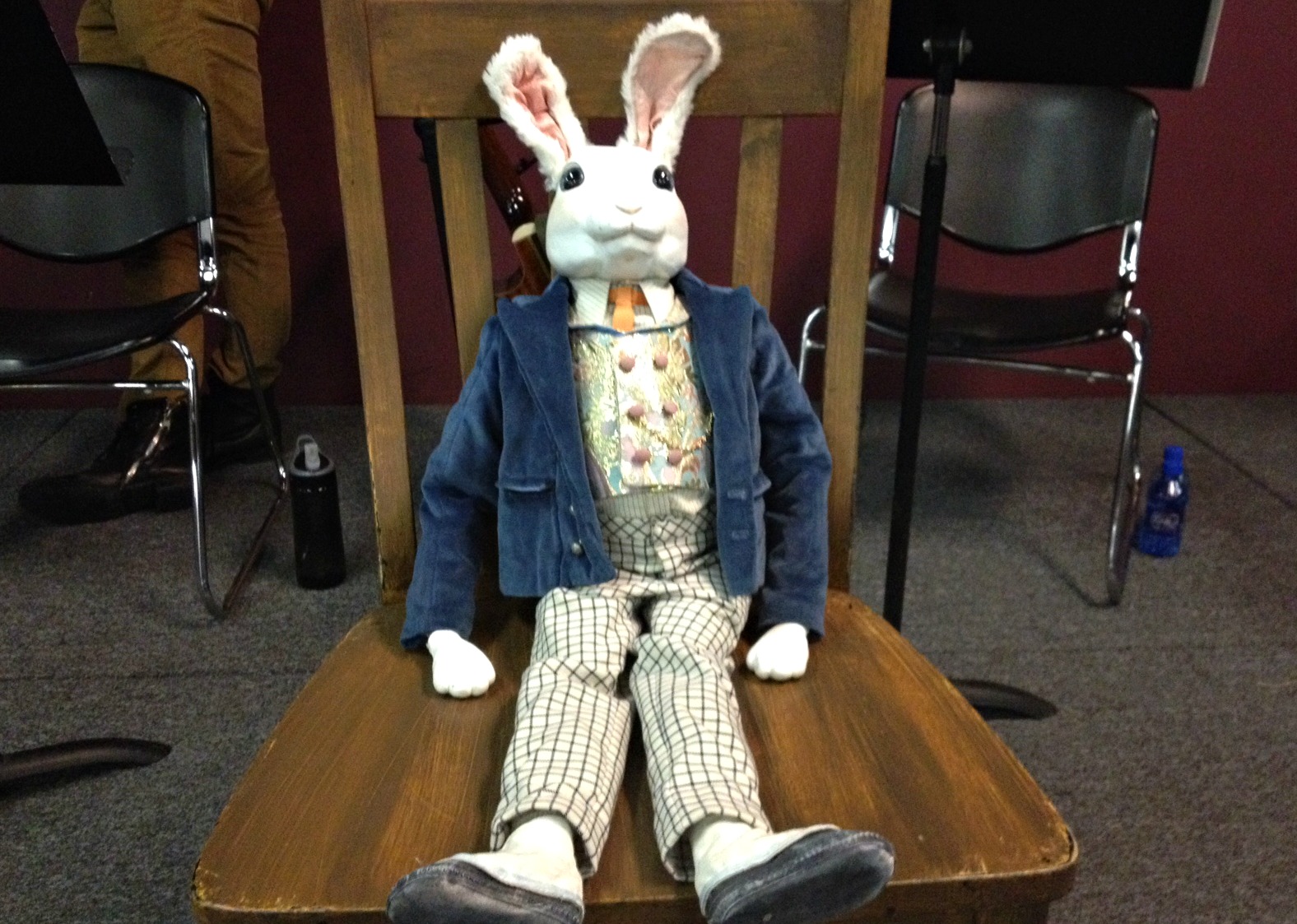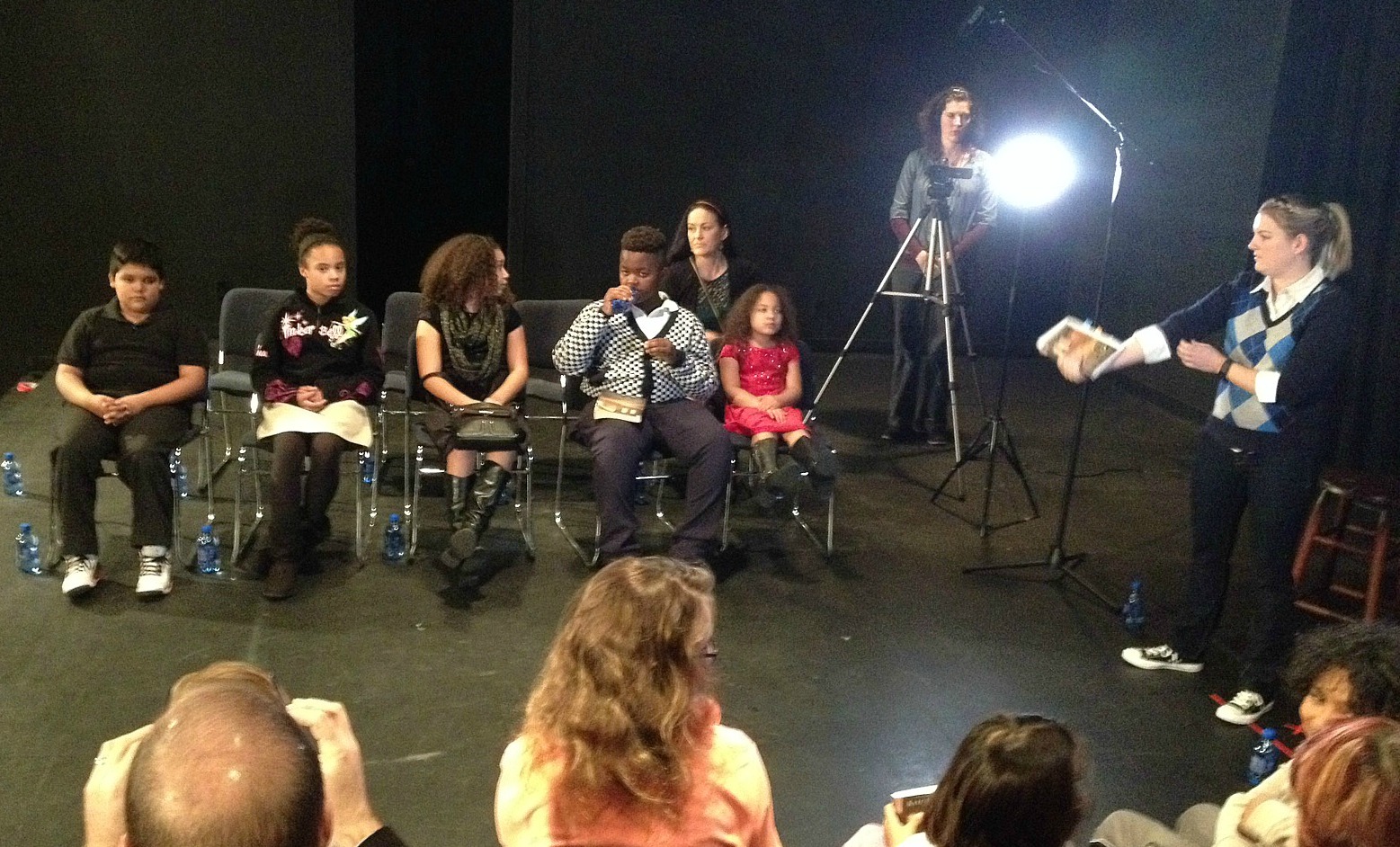A Toy Rabbit And A Lesson About Love And Loss At Dallas Children’s Theater
ArtandSeek.net March 17, 2016 198
Edward Tulane in rehearsal. Photo: Jerome Weeks
The Dallas Children’s Theater has started an experiment with its new show, ‘The Miraculous Journey of Edward Tulane.” It invited five families to read the original book, talk about it, see an early rehearsal. KERA’s Jerome Weeks reports the idea is to deepen family engagement. But for one young girl, that happened in a profound way no one expected.
With Sonny Franks playing guitar, Amber Devlin begins to read: “Once in a house on Egypt Street, there lived a rabbit made almost entirely of china. But how did such a thing come to be?
“Did the rabbit belong in this fine house? Was this the rabbit’s home? Ah, now that is an interesting question.”
A couple dozen parents and children already know the answer to those questions. They’re watching an early rehearsal at the Dallas Children’s Theater. They know Edward Tulane is a large white rabbit doll. He’s a vain, cold-hearted toy owned by a girl named Abilene. Abilene accidentally loses him – and Edward begins 20 years of wandering, learning about suffering and loss and love.
The children know this because they’ve read Kate DiCamillo’s book, “The Miraculous Journey of Edward Tulane.” The families volunteered to be part of the Edward Tulane Journeymakers Project. It’s an effort by the children’s theater to get kids involved in a production before it comes to the stage.
Sandra Session-Roberts is the theater’s director of communications. She created the Project to engage young theatergoers and learn from them. Does a family reading a book together help? How much do the kids really understand?
‘We want to see what value this brings to our families,’ says Session-Roberts. ‘Is this one of those deeper audience experiences that will make seeing the play even more memorable and more precious?’
What Session-Roberts devised was part book club, part focus group, part backstage visit. The kids read DiCamillo’s book and they answered a list of questions about it. Then they came to the theater for a book club meeting — a public discussion prompted by Steph Garrett, one of the actors in the cast. Then they came to the reading, and eventually, they’ll see the finished show.

Steph Garrett (right) leads the book club / focus group session on ‘Edward Tulane’ with Rodrigo Ruiz, Taryn Fields, MyLisa Mitchell, Donald Hall, Megan Mitchell and Mataya Mitchell. Photo: Jerome Weeks
But for some kids, this all looked too much like homework.
Zander Moore is seven: ‘At first I did not want to do this, then I kinda’ve wanted to do it then I did want to do it. It’s crazy.’
His father Aaron laughs, ‘But you liked it in the end?’
‘Yeah.’
Other kids went along for their own nefarious reasons. Morgan, who’s 13, and her mother Julaine Hunter.
‘It was more of an excuse to stay up til, what, 8:30? 8:45? And just read a book.’
‘Stretch it out as late as possible.’
‘Yeah.’
Morgan actually has seen a fair number of shows at the theater. For her and kids like her, the appeal was seeing a show in progress.
And then there’s Lily Howard. Lily is eight. Her five year old sister Harper was born with CDKL5, a rare genetic disorder that causes seizures. Lily read some of ‘Edward Tulane’ to Harper.
‘I have to give her a huge amount of credit,’ says their mother, Penny Howard. Lily was ‘a very mature big sister that made sure that she was always, you know, playing in the doll house or reading the book with her.’

The cast of ‘The Miraculous Journey of Edward Tulane’: Johnny Lee, Georgia Clinton, Edward Tulane, Sonny Franks and Steph Garrett. Photo: Karen Almond.
The week before the Howards were to attend the book club meeting, Harper died. The family had known this was inevitable but it still was a shock.
One task Lily and the others in the Tulane project were assigned was to choose a passage from the book that spoke to them. Lily chose an early scene when Abilene’s grandmother, Pellagrina, suddenly stops a story she’s telling with ‘The End.’ Abilene objects; she wants to know what happens to the characters.
Lily reads from there.
“‘The end,’ said Abilene. ‘Yes,’ said Pellagrina, ‘the end.’
‘But it can’t be!’
‘Why can’t it be?
‘Because it came too quickly, because no one is living happily ever after, that’s why.’”
In the book, Edward learns people are precious because we can lose them. His owners leave him, one even dies. As a result, some parents find the book too sad for children. But Penny Howard believes Lily benefited from reading ‘Edward Tulane’ to her sister Harper before she died.
“I think that for her to read this book of loss and connect with that,” she says, “and live through it at the same time is an experience she’ll never forget.”










